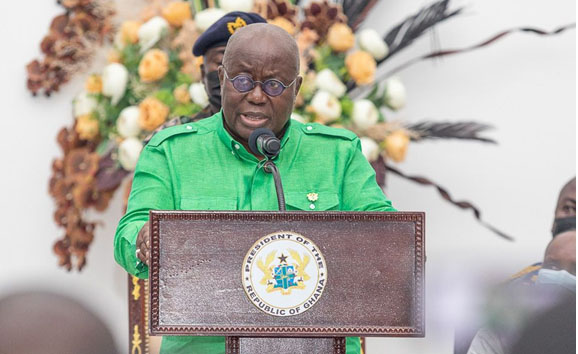President Nana Akufo-Addo
PRESIDENT NANA Addo Dankwa Akufo-Addo has been chairing a three-day crunch meeting to address the recent economic challenges confronting the nation.
The meeting stems from the continuous depreciation of the cedi and the recent increments in fuel prices stemming from global pressures.
The deliberations, which started Friday at the Peduase Lodge and expected to end Sunday, March 20, 2022, has in attendance all NPP MPs, ministers, government appointees, and leaders of the ruling New Patriotic Party (NPP).
The discussions are expected to proffer solutions to other pressing economic conditions and transforming the economy.
Giving information on the retreat, in a tweet on Thursday, a member of the governing New Patriotic Party (NPP), Gabby Otchere-Darko, suggested a national debate on whether to sign onto IMF conditionalities as a result of the challenges or push for the E-Levy Bill.
He said, “2022 began without the usual $3 billion injections of Eurobond cash. Govt’s post-COVID recovery GhanaCARES programme hinged partly on an E-Levy which Parliament may not even OK.
“There should be a national debate: Do we want IMF or E-Levy or both or none? Tough decisions confront Ghana,” he said.
IMF Not On Agenda
However, reports suggest the Akufo-Addo administration may not consider an IMF bailout for Ghana, despite acknowledging the dire economic situation the country finds itself in.
This is due to the fact that the IMF conversation is missing on the agenda of President Akufo-Addo’s crucial Cabinet retreat, taking place at Peduase in the Eastern Region.
A highly placed inside source told Citi News that the meeting, held quarterly, will also consider the reopening of the country’s land borders and discussions on the ever-rising fuel prices.
The opposition National Democratic Congress (NDC) has urged the government to “swallow its pride” and return to the IMF for help.
The government, on the other hand, has insisted on fashioning out and applying home-grown solutions to the country’s economic challenges.
Reopening Land Borders
The Cabinet retreat, which is in its second day, has already decided to reopen the country’s land borders, two years after they were closed.
Information Minister, Kojo Oppong Nkrumah, gave the hint Thursday.
President Akufo-Addo first closed the borders on Sunday, March 22, 2020, in a frantic effort to curtail or prevent the importation of the COVID-19 virus, which was then sweeping through the world.
Ghanaians returning home and foreign nationals with Ghanaian residence permits were, however, allowed back, subject to a 14-day mandatory quarantine period.
The Minority in Parliament, however, renewed calls for the borders’ reopening following concerns from border town residents.
President Akufo-Addo is, thus, expected to announce the easing of the restrictions in the coming week.
Fuel Price Hikes
Cabinet is also discussing the global fuel price situation and its impact on pump prices in the country. It is expected to discuss possible mitigation measures for the Ghanaian consumer.
IEA
The Institute of Economic Affairs (IEA) is, meanwhile, urging government not to go to the International Monetary Fund (IMF) for financial and economic support, but rather adopt some of the key measures that the Bretton Woods Institution is known to prescribe for members seeking its assistance.
In a statement issued on Friday, signed by Dr. John Kwakye, a senior fellow, he stated, “I suggest below, measures that I believe government and Bank of Ghana can take to help build the needed policy credibility, restore the economy to some level of sanity and make going to the IMF unnecessary.”
The IEA believes prescriptions such as working to resolve the current budget stalemate in Parliament over the Electronic Transaction Levy (E-Levy) should be urgently done.
To that end, the IEA said, “We suggest splitting the proposed rate of I.75% between telcos (I.0%) and consumers (0.75%). We believe this is a compromise that both the Majority and Minority can accept.”
Others are the need for government to take additional measures to scale up revenue, which is below par.
The IEA, therefore, wants the Tax Exemptions Bill to be passed to reduce the scope and scale of exemptions in addition to enforcing tax compliance, especially by professionals and introduction of segregated corporate tax, ranging from the current level of 25% for indigenous companies to 35% for foreign companies, abolishing the current import benchmark discount of 30% for general goods and 10% for vehicles, amongst others.
Again, it wants government to take urgent measures to reduce expenditure, whose level and composition remain problematic.
The measures, it added, should also look at how to “restructure ministries and reduce the number from 30 to 20, reduce the number of ministers from 86 to 56 (including 16 regional ministers), slash executive pay by 20% and enforce the announced 20% reduction of MDA’s budgets.”
The IEA also wants government to reduce the 2022 fiscal deficit from 7.4% to 6.0% to boost the credibility of the budget and reduce concerns regarding both fiscal and debt sustainability.
BY Vincent Kubi


